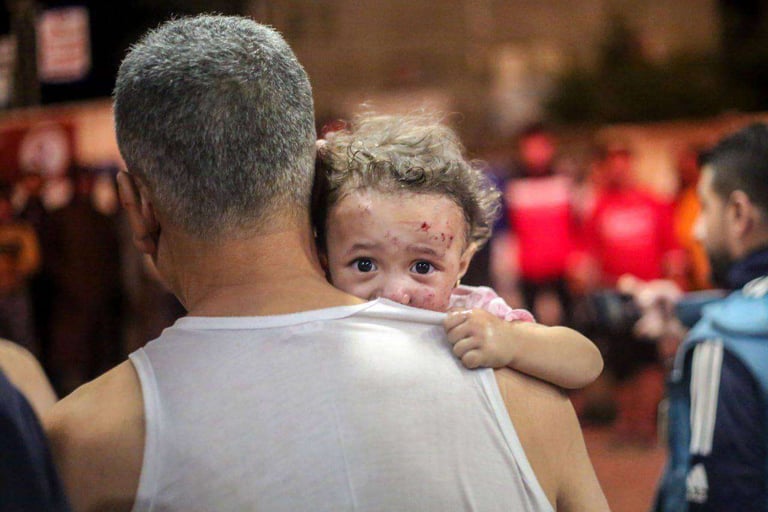

The Catastrophic Escalation of Human Rights Violations Since October 7, 2023
The primary human rights violations during this period include:
1. Widespread Bombardment and Unprecedented Civilian Casualties
The scale of death and destruction in Gaza in the first few months of the war has been described by many analysts as unprecedented.
Massive Human Toll: Tens of thousands of Palestinians were killed in the initial months of the war. According to reports from the Gaza Ministry of Health and international bodies, over 70% of them were women and children. This high figure raises serious questions about the Israeli military's adherence to the principles of distinction and proportionality under international humanitarian law.
Widespread Destruction of Civilian Infrastructure: Israeli airstrikes have completely destroyed vast swaths of residential areas, schools, universities, mosques, churches, and critical infrastructure such as bakeries and water facilities. This level of devastation has rendered Gaza uninhabitable.
Use of Heavy Explosive Weapons in Densely Populated Areas: The extensive use of large bombs (such as 2,000-pound bombs) in densely populated residential areas has been a major cause of the high civilian death toll and has been heavily criticized.
2. Forced Displacement and Attacks on "Safe Zones"
One of Israel's most controversial actions was issuing an evacuation order for over 1.1 million people from northern Gaza to the south in the early days of the war.
Forcible Transfer: This act was described by UN legal experts as the "forcible transfer of a population," which constitutes a war crime. The order was issued without any guarantee of safety, shelter, or basic necessities for the displaced population, creating a massive humanitarian crisis.
Attacks on "Safe" Areas: Despite Israel designating southern Gaza as a "safe zone," these areas were also repeatedly subjected to intense bombardment, killing thousands of people in the very places where they had sought refuge. This rendered the concept of "safe zones" meaningless.
3. Total Siege and the Use of Starvation as a Weapon of War
At the outset of the war, Israel's Defense Minister ordered a "total siege" of Gaza, declaring that "no electricity, no food, no water, no fuel" would be allowed into the territory.
Collective Punishment: This action is a clear example of collective punishment, which is prohibited under the Fourth Geneva Convention.
Collapse of the Healthcare System: The cutoff of electricity and fuel led to the complete collapse of hospitals. Without power, hospitals were unable to operate life-saving equipment, such as ventilators and incubators for premature babies.
Famine and Malnutrition: Severe restrictions on the entry of humanitarian aid, particularly food, have caused widespread famine and malnutrition, especially among children. International organizations have repeatedly warned that Israel is using starvation as a weapon of war.
4. Systematic Attacks on the Healthcare System and Humanitarian Workers
Gaza's healthcare system has been systematically targeted.
Attacks on Hospitals: Dozens of hospitals and medical centers in Gaza have been directly attacked, besieged, or occupied by Israeli forces. These actions are a clear violation of the protected status of medical facilities during wartime.
Killing of Medical and Aid Workers: Hundreds of medical personnel, UN staff (notably from UNRWA), and aid workers from international NGOs have been killed in Israeli strikes—a figure unprecedented in modern conflicts.
5. Escalated Repression in the West Bank
Simultaneously with the war in Gaza, violence in the West Bank has also sharply increased.
Increased Settler Attacks: Attacks by armed settlers on Palestinian communities, often with the support or non-intervention of the Israeli military, have escalated dramatically, resulting in the deaths of dozens of Palestinians and the displacement of hundreds of families.
Rise in Detentions and Military Raids: The Israeli army has detained thousands of Palestinians in the West Bank and intensified military raids on cities and refugee camps.
International Legal Reactions
This war has triggered unprecedented legal responses at the international level:
Genocide Case at the International Court of Justice (ICJ): South Africa filed a case against Israel at the ICJ, accusing it of violating the Genocide Convention. In a landmark provisional ruling, the court ordered Israel to take all necessary measures to prevent genocidal acts in Gaza and to facilitate the entry of humanitarian aid.
Investigation by the International Criminal Court (ICC): The ICC's prosecutor has sought arrest warrants for senior leaders of Hamas (on charges of war crimes and crimes against humanity for the October 7th attacks) as well as for Israel's Prime Minister and Defense Minister (on charges of war crimes and crimes against humanity in Gaza, including the use of starvation as a weapon of war).
Final Conclusion: The war since October 7 has transformed the human rights crisis for Palestinians into a full-blown catastrophe, revealing new and horrifying dimensions of human suffering and violations of international law whose consequences will reverberate for decades to come.